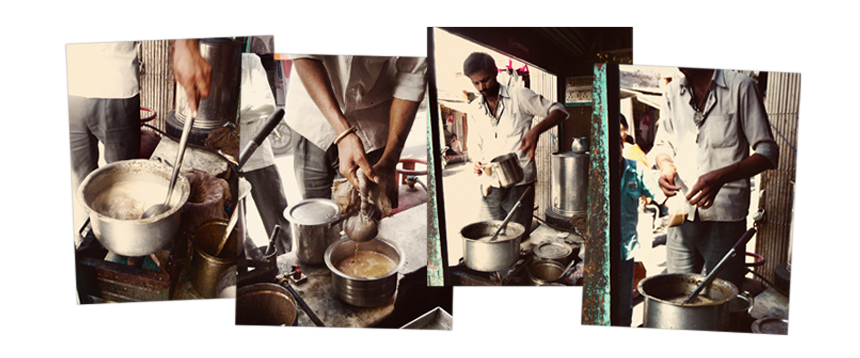Our very talented friend Stephanie Davidson whipped up this map to give readers a sneak peek at the places we’ll visit on our journey and what makes each destination unique.
Check out Stephanie’s work at http://stephanie-davidson.com/

Our very talented friend Stephanie Davidson whipped up this map to give readers a sneak peek at the places we’ll visit on our journey and what makes each destination unique.
Check out Stephanie’s work at http://stephanie-davidson.com/
 In Hindi, a wallah is someone makes or sells a certain good. Chai means tea. A chai wallah is person who makes or sells tea—or both! But in India, chai isn’t simply tea, a hot drink made with water and leaves. Nor is it a “chai tea latte,” the popular beverage sold at coffee chains that is often made from a concentrate. Chai wallahs in India brew their chai fresh all day, every day. They usually use black tea, ginger root, cardamom, cinnamon, cloves, black pepper, and many other spices depending on the region. Since the British helped popularize tea in India, chai wallahs have been setting up stands throughout the country and caffeinating the population, one small cup at a time.
In Hindi, a wallah is someone makes or sells a certain good. Chai means tea. A chai wallah is person who makes or sells tea—or both! But in India, chai isn’t simply tea, a hot drink made with water and leaves. Nor is it a “chai tea latte,” the popular beverage sold at coffee chains that is often made from a concentrate. Chai wallahs in India brew their chai fresh all day, every day. They usually use black tea, ginger root, cardamom, cinnamon, cloves, black pepper, and many other spices depending on the region. Since the British helped popularize tea in India, chai wallahs have been setting up stands throughout the country and caffeinating the population, one small cup at a time.
India’s chai wallahs are a constant, unifying presence in a profoundly diverse country -from the deserts of Rajasthan to the seaside megacity of Mumbai to the call centers and factories driving India’s economic rise. Chai wallahs can be found in cities, in villages and on the trains connecting them. In a market or on a roadside, chai wallahs are never far away, bringing customers together from different walks of life around their small stands.
The local chai stand often serves as the gateway to a community and dropping by one is the perfect way to gather the pulse of a place. People gather to discuss everything from politics to cricket or just to meet their friends and break up the daily rhythm of life.
The same way New York cab drivers might be able to tell the story of the city through their interactions with customers, chai wallahs can tell the story of India in all its complexity.
Zach and Resham lived in India from 2010-2011 on Fulbright Fellowships. They are returning to write a book on chai wallahs around India. In a country with tremendous diversity, chai wallahs are a constant presence, from urban slums to rural villages to the call centers and factories driving India’s economic rise. The same way New York City cab drivers might be able to tell the story of the city through their interactions with customers, chai wallahs can tell the story of India in all its diversity and complexity.